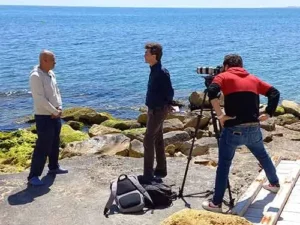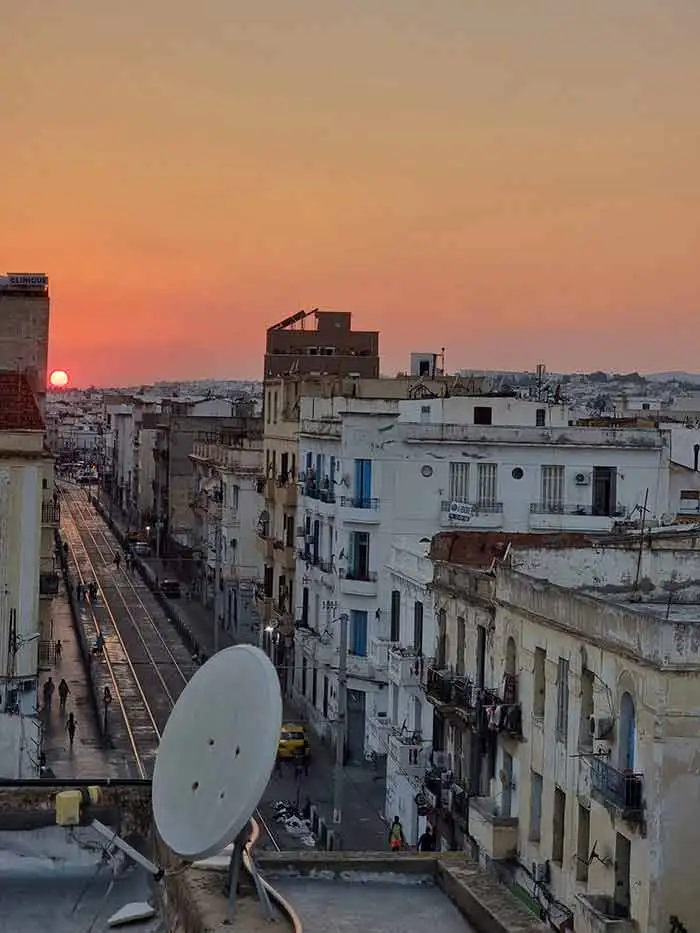In the vibrant heart of North Africa, Tunisia boasts a treasure trove of cinematic backdrops, making it an ideal destination for filmmakers, journalists, and media enthusiasts alike. From ancient ruins to bustling souks, this culturally rich nation offers a plethora of opportunities for creative minds. In this article, we will explore the best time for cinema crews and journalists to travel to Tunisia, ensuring they capture its true essence while considering factors like weather and climate.

Film on the board of the Mediterranean Sea. A rocky beach. doing interviews
- The Ideal Window for Broadcasting and Production:
When planning your media projects in Tunisia, timing is of the essence. The most favorable time for cinema crews and journalists to visit this stunning country is from February to June and from mid-September to December. During these periods, Tunisia experiences milder temperatures, making outdoor shoots and reporting more comfortable.
Tunisia’s climate is typically Mediterranean, characterized by hot summers and mild winters. While the summer months of July and August may attract tourists due to their school holidays, it’s not the best time for filming or reporting. The scorching temperatures during these months, with highs often reaching 49°C (120°F), can be challenging for both equipment and crew, particularly in the southern regions. Additionally, the heat may limit outdoor activities and exhaust performers and interviewees, hampering the overall quality of your production.
- Embracing the Mild Seasons:

Sunset in Tunisia
a) Spring: During the spring months of February to June, Tunisia blooms with life and color. The landscapes are adorned with wildflowers, and the temperatures range from 18°C to 28°C (64°F to 82°F). This season is perfect for capturing breathtaking shots of the country’s scenic beauty, cultural festivals, and lively street scenes.
b) Summer: During the summer season in Tunisia (June to September), the weather is hot and dry, with temperatures ranging from 28°C to 35°C (82°F to 95°F), occasionally reaching up to 42°C to 45°C in certain regions. It is important to be cautious of the high temperatures. The summer is a great time for capturing vibrant beach scenes, enjoying water sports, and exploring Tunisia’s coastal beauty. The clear blue skies and warm Mediterranean waters provide a perfect setting for outdoor activities and water-related shoots, but prolonged outdoor shoots can be challenging due to the scorching temperatures.
c) Autumn: From mid-September to December, Tunisia experiences a second favorable window for media production. The temperatures cool down, hovering between 18°C to 25°C (64°F to 77°F), providing comfortable shooting conditions. The autumn colors add warmth and depth to your visuals, making it an excellent time for documentary projects or capturing cultural events.
d) Winter: Tunisia’s winter season stretches from December to February, offering a unique perspective for media production. The temperatures during this time range from 12°C to 18°C (54°F to 64°F). While it may not be the ideal season for beach-related shots, the winter provides opportunities to capture a different side of the country. The cooler climate and occasional rain create a lush, green landscape, making it an excellent time for shooting nature documentaries, exploring historical sites, and capturing the tranquility of the countryside. Winter also allows for the celebration of various traditional festivals and cultural events, which can add depth and cultural richness to your media projects.
- Technical Equipment and Facilities:
To ensure top-notch broadcasting and production quality, it is crucial to work with reliable technical equipment and facilities. Companies like Aviwest offer cutting-edge solutions, including video transmission systems and mobile broadcasting units, which are invaluable tools for streaming live events, conducting interviews in remote locations, and reporting on breaking news across Tunisia.
- Exploring the Media Production Landscape:
Tunisia has a well-established media production industry with access to state-of-the-art studios and skilled professionals. Whether you need post-production facilities, sound stages, or drone services for aerial shots, Tunisia’s media infrastructure has got you covered.
Tunisia is a land of enchantment and diversity, providing an incredible canvas for media professionals to create captivating content. When planning your next film, documentary, or news coverage, consider the best time to travel—from February to June and from mid-September to December—to ensure a successful and enjoyable production experience. Embrace the mild weather conditions, explore the country’s breathtaking landscapes, and tap into the support of reliable technical equipment and facilities for a seamless media production journey in Tunisia. So, pack your bags, charge your cameras, and get ready to broadcast the beauty and allure of this North African gem to audiences around the world!

